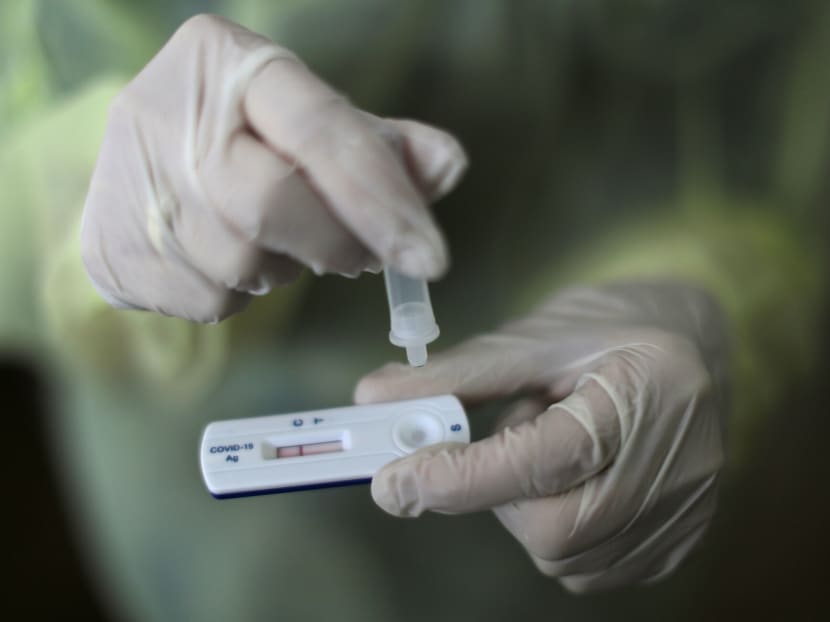S’pore to pilot Covid-19 rapid test at selected weddings, live shows with an eye on resuming large-scale events
SINGAPORE — A new cheaper and faster Covid-19 test will be trialled at large-scale events such as selected wedding receptions and live shows, as Singapore moves to resume more social and economic activities amid the Covid-19 outbreak, the Ministry of Health (MOH) said on Tuesday (Oct 20).

A healthcare worker performs a rapid Covid-19 antigenic test at a Covid-19 testing centre in Nice, France.
SINGAPORE — A new cheaper and faster Covid-19 test will be trialled at large-scale events such as selected wedding receptions and live shows, as Singapore moves to resume more social and economic activities amid the Covid-19 outbreak, the Ministry of Health (MOH) said on Tuesday (Oct 20).
Under the pilot, participants of these selected events will have to obtain a negative antigen rapid test (ART) before they can attend them, said MOH in a statement.
Currently, the polymerase chain reaction (PCR) test is the main test used in Singapore to confirm Covid-19 cases.
But PCR tests take a few days to process and involve more manpower and logistics, as they are processed in laboratories, while ARTs can be processed within 15 minutes, although they are less accurate than PCR tests.
The ARTs that are being piloted are also easier to administer, said MOH, as they require only a navel swab sampled from the lower part of the nostril.
As part of the pilot, the authorities will identify selected events across various settings from mid-October to December this year.
These would include settings such as business-to-business events, wedding receptions, live performances, and sports events, MOH said.
The ministry said the ARTs that will be used in the pilot minimally meet the World Health Organization’s (WHO) recommendation of at least 80 per cent sensitivity and 97 per cent specificity.
This means that the tests will be able to pick up at least 80 per cent of individuals who are infected with the coronavirus, and will show a result of 3 per cent false positives in healthy individuals, the ministry added.
Participants will be tested either at the event venue or at a separate testing facility.
Individuals who obtain a positive ART test will have to self-isolate and take a confirmatory PCR test. During this time, they must also avoid public transportation.
As an ART negative result is valid for only 24 hours from the time an individual is swabbed, daily testing will be required for events that stretch over multiple days.
MOH said exemption will only be granted to individuals who have recently recovered from Covid-19. For instance, a patient who first tested positive for the coronavirus 180 days before a particular event will be exempted from taking an ART to attend that event.
Even with the new tests, MOH said event participants will have to continue to adhere to safe management guidelines, such as wearing a mask, maintaining a safe distance from others and limiting group sizes to reduce the risk of infection.
This is because with the lower accuracy of the ARTs, there is still a possibility that a positive coronavirus case could slip through and attend an event.
Participants attending events selected for this pilot will be informed by the event organiser on the specific requirements they would have to meet, as different processes will be tried out at each pilot event.
MOH said it will gather feedback from event organisers and participants to fine-tune these processes.
“If these pilots prove successful, (the ministry) will assess how to make these tests available for more widespread use,” it said.
During a conference by the multi-ministry task force handling Singapore’s response to Covid-19, Education Minister Lawrence Wong said there are currently no plans to roll out ART for travellers.
Currently, travellers who enter Singapore are given the PCR test.
Still, Mr Wong, who is also co-chair of the task force, said the authorities are “not closed to” considering other options other than PCR tests, but added that these tests must be able to pick up cases effectively, to minimise the risk of imported cases as Singapore reopens its borders.











